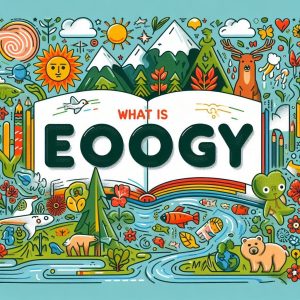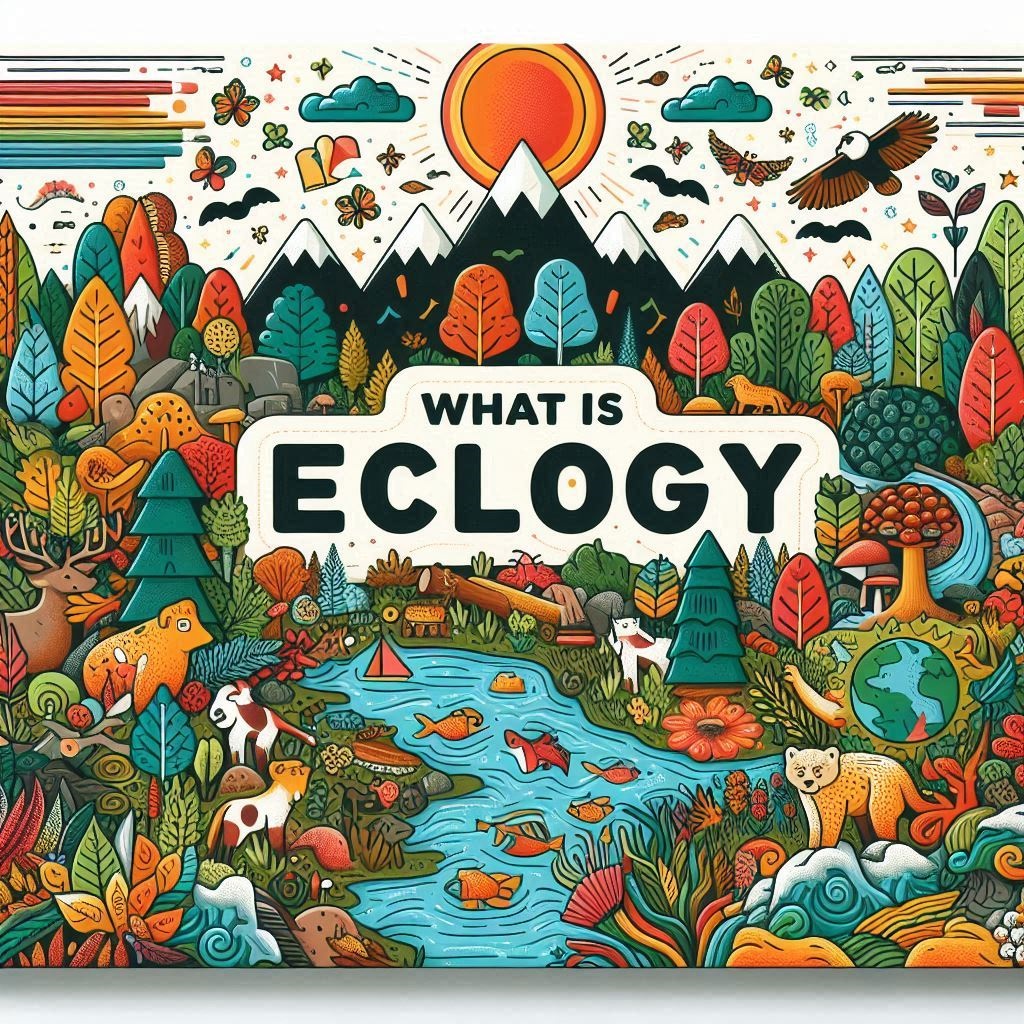Introduction
what is ecology: Ecology is the scientific study of the interactions between organisms and their environments. This branch of biology examines how organisms interact with each other and with their physical surroundings, including both biotic (living) and abiotic (non-living) components. Understanding ecology is crucial for addressing many environmental challenges and promoting sustainability.
Key Principles of Ecology
Ecology is grounded in several key principles that help scientists understand the complex web of life. These principles include:
- Interconnectedness: All organisms are interconnected and depend on each other for survival. Changes in one part of an ecosystem can have far-reaching effects.
- Energy Flow: Energy flows through ecosystems in a one-way stream, from primary producers (such as plants) to various levels of consumers and finally to decomposers. Learn more about energy flow in ecosystems at Nature Education.
- Nutrient Cycling: Essential nutrients cycle through ecosystems, moving between organisms and their physical environment. For insights on nutrient cycling, visit ScienceDirect.
- Population Dynamics: Populations of organisms fluctuate based on birth rates, death rates, and interactions with other species. This dynamic balance influences the structure of ecosystems.
- Adaptation and Evolution: Organisms adapt to their environments over time through evolutionary processes, shaping their ability to survive and reproduce.
Ecological Hierarchies
Ecology examines life at various levels of organization, from individual organisms to entire ecosystems. These levels include:
- Individual Organisms: The study of individual organisms focuses on their physiology, behavior, and adaptations to the environment.
- Populations: Population ecology studies groups of individuals of the same species, their interactions, and factors influencing population size and structure.
- Communities: Community ecology examines interactions between different species living in the same area and how these interactions shape the community structure. Learn more about community ecology at Britannica.
- Ecosystems: Ecosystem ecology focuses on the flow of energy and nutrients between organisms and their environment within a specific area.
- Biomes: Biomes are large regions characterized by specific climatic conditions and dominant plant communities, such as tropical rainforests, deserts, and tundras.
- Biosphere: The biosphere encompasses all ecosystems on Earth, integrating them into a global system of life.

Importance of Ecology
Biodiversity Conservation
Ecology is crucial for the conservation of biodiversity, which refers to the variety of life forms within a given ecosystem, region, or on the entire Earth. Biodiversity is essential for ecosystem stability, and resilience, and for providing ecosystem services such as pollination, nutrient cycling, and water purification. Ecologists study the relationships between species and their environments to identify critical areas for conservation and to develop strategies for protecting endangered species and habitats. For more information on biodiversity conservation, visit the World Wildlife Fund.
Climate Change Mitigation
Ecology plays a significant role in understanding and mitigating the impacts of climate change. By studying the interactions between organisms and their environments, ecologists can predict how ecosystems respond to changing climate conditions. This knowledge helps in developing strategies for climate change adaptation and mitigation, such as protecting carbon sinks like forests and wetlands, which absorb and store carbon dioxide. Learn more about the ecological impact of climate change at NASA Climate Change.
Sustainable Resource Management
Ecology informs the sustainable management of natural resources, ensuring that they are used in ways that meet current needs without compromising the ability of future generations to meet their own needs. Ecologists study how ecosystems function and provide services that support human well-being, such as clean water, fertile soil, and food production. This knowledge is applied to manage resources like forests, fisheries, and agricultural lands sustainably. For insights into sustainable resource management, visit IUCN.
Environmental Restoration
Ecological research is fundamental to the restoration of degraded ecosystems. Restoration ecology focuses on repairing damaged ecosystems to restore their functionality and biodiversity. Ecologists develop techniques for re-establishing native species, controlling invasive species, and rehabilitating soil and water quality. These efforts help to recover ecosystems’ health and resilience, providing benefits for both nature and people. Learn more about environmental restoration at Society for Ecological Restoration.
Human Health
The health of ecosystems directly impacts human health. Ecology helps to understand the environmental factors that affect human health, such as air and water quality, the spread of diseases, and the availability of natural resources. By studying ecological processes, scientists can identify and mitigate health risks associated with environmental degradation and climate change. This interdisciplinary approach promotes healthier ecosystems and human communities. For information on the link between ecology and human health, visit World Health Organization.
Economic Benefits
Healthy ecosystems provide numerous economic benefits, including tourism, agriculture, and fisheries. By maintaining biodiversity and ecosystem services, ecology supports industries that rely on natural resources. Ecologists work with policymakers and businesses to promote sustainable practices that protect ecosystems while also supporting economic growth. For more on the economic benefits of ecology, check out The Economics of Ecosystems and Biodiversity (TEEB).
Education and Public Awareness
Ecology education and public awareness are essential for fostering a sense of stewardship for the environment. Through education programs, ecologists raise awareness about the importance of conserving ecosystems and the impacts of human activities on the natural world. Engaging the public in citizen science projects and conservation efforts helps to build a more informed and active society that supports environmental sustainability. For educational resources on ecology, visit National Geographic.
The importance of ecology cannot be overstated. It provides the foundation for understanding the natural world and our place within it. By studying ecological processes and interactions, ecologists contribute to biodiversity conservation, climate change mitigation, sustainable resource management, environmental restoration, and human health. The future of ecology lies in integrating traditional knowledge with advanced technologies to address the environmental challenges of the 21st century. For further reading on the importance of ecology, visit the Ecological Society of America.
Branches of Ecology
Ecology is a diverse field with various branches, each focusing on different aspects of ecological interactions and processes. Here’s an overview of the main branches of ecology:
1. Population Ecology
Population ecology examines the dynamics of species populations and how they interact with their environment. It focuses on factors such as population size, density, distribution, and growth rates. Key topics include the study of birth and death rates, immigration, emigration, and the impact of environmental factors on population changes. For more information, visit Oxford University Press.
2. Community Ecology
Community ecology explores the interactions between different species within a community and how these interactions shape community structure and function. It investigates topics such as competition, predation, mutualism, and the effects of species diversity on ecosystem stability. Community ecology helps in understanding the complex web of relationships within ecosystems. Learn more at Natural History Museum.
3. Ecosystem Ecology
Ecosystem ecology focuses on the flow of energy and nutrients through ecosystems. It examines how biotic (living) and abiotic (non-living) components interact to influence ecosystem processes such as primary production, decomposition, and nutrient cycling. Ecosystem ecologists study how ecosystems function and respond to changes, including human impacts. For detailed insights, check out Encyclopaedia Britannica.
4. Landscape Ecology
Landscape ecology investigates the patterns and processes occurring at the landscape scale, which encompasses multiple ecosystems. It examines how spatial patterns, such as land use changes and habitat fragmentation, affect ecological processes and species distributions. This branch is essential for understanding the impact of human activities on ecological patterns and functions. For more information, visit Springer.
5. Behavioral Ecology
Behavioral ecology studies the behavior of organisms in relation to their environment and evolutionary pressures. It focuses on how behavioral adaptations improve survival and reproductive success. Topics include foraging behavior, mating strategies, and social interactions. Behavioral ecology helps explain why certain behaviors are advantageous in specific ecological contexts. Learn more at PubMed Central.
6. Evolutionary Ecology
Evolutionary ecology explores the interactions between evolutionary processes and ecological dynamics. It examines how evolutionary changes in species affect ecological relationships and vice versa. This branch integrates principles from both evolutionary biology and ecology to understand patterns of diversity and adaptation. For detailed reading, check out Cambridge University Press.

7. Marine Ecology
Marine ecology is concerned with the study of oceanic and coastal ecosystems. It examines the interactions between marine organisms and their environments, including the effects of ocean currents, salinity, and temperature. Marine ecologists study coral reefs, kelp forests, and other marine habitats to understand their functions and threats. For further information, visit NOAA Ocean Service.
8. Freshwater Ecology
Freshwater ecology focuses on ecosystems in rivers, lakes, wetlands, and other freshwater environments. It studies the relationships between freshwater organisms and their habitats, including the impacts of pollution, water management practices, and climate change. Understanding freshwater ecosystems is crucial for managing water resources and preserving aquatic biodiversity. For more details, see Wetlands International.
Challenges and Future Directions
Ecology faces several challenges, including habitat destruction, climate change, pollution, and invasive species. Addressing these challenges requires multidisciplinary approaches and collaboration across scientific, policy, and community sectors. The future of ecology lies in integrating traditional ecological knowledge with advanced technologies, such as remote sensing, molecular biology, and data analytics. For insights into the future of ecological research, visit Nature Communications.
Conclusion
Ecology is a vital field of study that provides critical insights into the interactions between organisms and their environments. By understanding these interactions, ecologists contribute to biodiversity conservation, climate change mitigation, sustainable resource management, and environmental restoration. As the world faces unprecedented environmental challenges, the role of ecology in guiding sustainable practices and policies becomes increasingly important. For further reading on ecology, visit Ecological Society of America.
Frequently Asked Questions about Ecology
1. What is Ecology?
Ecology is the scientific study of interactions among organisms and their environment. It focuses on the relationships between living organisms, including humans, and their physical surroundings.
2. Why is Ecology important?
Ecology is crucial for understanding the natural world and our impact on it. It helps in conserving biodiversity, managing natural resources sustainably, and addressing environmental issues such as climate change.
3. What are the main branches of Ecology?
The main branches of ecology include population ecology, community ecology, ecosystem ecology, and landscape ecology, each focusing on different levels of ecological interactions.
4. How do ecologists conduct their research?
Ecologists use various methods such as field studies, laboratory experiments, and computer models to study ecosystems and the interactions within them.
5. What is the role of Ecology in climate change mitigation?
Ecology helps to understand how ecosystems respond to climate change and develop strategies for mitigation and adaptation, such as protecting carbon sinks and restoring degraded habitats.
6. Can individuals contribute to ecological research?
Yes, individuals can contribute through citizen science projects, where they collect data on local wildlife, plants, and environmental conditions, aiding large-scale ecological studies.
7. How does Ecology impact human health?
Ecology impacts human health by studying the environmental factors that affect it, such as air and water quality, and the spread of diseases. Healthy ecosystems provide essential services that support human well-being.
8. What careers are available in the field of Ecology?
Careers in ecology include roles in research, environmental consulting, conservation management, education, and policy-making, among others.
9. How does Ecology differ from Environmental Science?
While ecology and environmental science study the environment, ecology specifically focuses on the relationships between organisms and their environment, including interactions and processes within ecosystems. Ecological science is broader and includes aspects of ecology and topics such as environmental policy, conservation, and the impact of human activities on the environment. For more information, visit National Geographic.
10. What tools do ecologists use for their research?
Ecologists use a variety of tools and methods, including field surveys, satellite imagery, geographic information systems (GIS), and laboratory experiments. These tools help in collecting and analyzing data about ecosystems, species interactions, and environmental changes. Modern technology, such as remote sensing and environmental sensors, also plays a crucial role in ecological research. Learn more about these tools at ScienceDirect.
11. How can I get involved in Ecology?
You can get involved in ecology through various means, including studying the subject at academic institutions, participating in citizen science projects, volunteering with conservation organizations, or working in related fields such as environmental consulting. Many organizations and institutions offer opportunities for public participation in ecological research and conservation efforts. For opportunities to get involved, visit Citizen Science Association.
Disclaimers and Caution
While the information provided here is intended to offer a general understanding of ecology, it should not be used as a sole resource for making decisions related to environmental management or conservation. Consulting with professional ecologists and relevant experts is recommended for specific ecological issues and interventions.
Additionally, ecological research is an evolving field, and new findings can change our understanding of various ecological processes and interactions. Staying updated with the latest research and scientific publications is crucial for accurate knowledge.
Engaging in ecological activities, such as field studies or conservation projects, should be done with caution and respect for local regulations and guidelines. Untrained individuals should seek guidance from professionals to avoid unintended harm to ecosystems.
Finally, while participating in citizen science projects or ecological research, it is important to ensure the accuracy and reliability of the data collected. Proper training and adherence to project protocols are essential for meaningful contributions.



